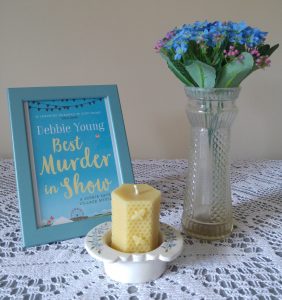
Debbie Young (bottom right) conspires with fellow indie authors Alison Morton, Carol Westron and David Penny – great writers, every one of them! – at CrimeFest 2018
When indieland is so full of advice about book marketing, it's too easy for writers to neglect or even forget what lies at the heart of all great books: great writing craft. ALLi's Author Advice Center Manager and indie author Debbie Young makes the case for getting the writing right being an inseparable part of successful self-publishing.
Reading one of Seeley James‘s answers in the interview that appeared on this blog yesterday was like a breath of fresh air to me – his top tip to indie authors was:
Craft and marketing. One cannot make up for the other. Study both with reckless abandon.
As the organiser of two local writers' groups and a small independent literary festival, as well as managing ALLi's blog and speaking at many litfests and author events, I meet a lot of aspiring indie authors at every stage of their game, and a growing number that are just starting out. Recently I have been becoming increasingly uneasy that far too many aspiring indie authors seem to be pinning all their hopes – or at least too big a proportion of them – on the effectiveness of marketing to turn them into a self-publishing success story.
As Seeley James suggests, effective marketing is an essential factor in determining an indie author's success – but there is no point in spending time, effort and money on marketing a book if it is not fit for public consumption.
How to Hone Your Writing Craft
This is not to say that authors ought to join writing critique groups or take creative writing degrees. Although I know many authors who swear that getting such a qualification kickstarted their career, I know just as many whose confidence and determination were set back by narrow-minded directives and poor advice in these settings. Only you can decide what works for you.
Nor is it essential to read all the writing craft books that you can lay your hands on. In fact, if you read too many, you risk either becoming confused by their contradictions, or you'll find your writing becoming formulaic as you apply the rules laid down by self-appointed experts . Stick to the handful of books that really resonate with you and add value to your writing. You'll know them when you find them.
Plenty of indie authors are getting it right, thoroughly self-editing their manuscripts before passing them to beta readers and professional editors for pre-publication quality control. But there are still too many who let their excitement and their impatience to publish their books suppress their common sense. The speed at which it's possible to publish books – at the touch of a button – ends up with the release of too many poorly written books, and with too many authors wondering why their massive marketing efforts fall flat.
I'm not for a moment trying to set myself up as a great example of writing craft. I still have much to learn, but my editor and beta readers tell me I'm getting a little better with each book – as we all should, because as with any activity, skill grows through practise. But I do know that I am trying as hard as I can, and I will not publish a book until I'm happy with every word.

Practising what I preach – one of many, many nitpicking passes through one of my novel manuscripts
Great Marketing Doesn't Trump Poor Writing
Even if you have endless financial resources to invest heavily in great covers, professionally-written persuasive blurbs and extensive advertising, readers who do not enjoy what's inside this enticing giftwrap will not come back for more.
I'm saddened when I read of yet another author complaining that the latest book marketing trend isn't working for them and a quick “look inside” on Amazon reveals an unpolished, hurried writing full of errors and inconsistencies. I don't want them to be hurt by poor reviews that say things like “it's amazing what rubbish can get published these days”. I'd rather such a wake-up call wasn't necessary in the first place. I'd rather they realised from the outset that:
Even the biggest marketing budget in the world will not build you a long-term successful career if you've written a dud.

Love your book – you deserve your book to be the best it can be
Of course, no-one wants to think they've written a dud, myself included. And of course, not all books that don't sell are duds. Sometimes, and far too often, a brilliantly crafted book won't sell for reasons that have nothing to do with the writing quality. Just a few of these are:
- lack of discoverability in an overcrowded market
- an unalluring, inappropriate or obscure cover that doesn't immediately identify what it's about, what its genre is or draw the right readers in
- not fitting into an established genre for which there's a clearly identifiable market – creating an uphill struggle because you then have to sell the concept of your book, as well as the book itself (it can be done – just look at the adult colouring book phenomenon that grew from a standing start – but it's not easy or guaranteed)
So if you're having trouble finding readers for your books, despite exhaustive and appropriate marketing efforts, give yourself some tough love, and make sure that in your eagerness to get your book to market, you haven't cut corners on quality control.
Yes, we can all name books that we think are badly written that have made their authors rich. But, hand on heart, would you really want to be that kind of author? I know I wouldn't.
So do yourself a favour: make your book the best it can be. You deserve it.
Even the biggest #bookmarketing budget won't build a successful #selfpublishing career unless you first make your book the best it can be, says #indieauthor @DebbieYoungBN Share on X
USEFUL POSTS TO HELP YOU MAKE YOUR BOOK THE BEST IT CAN BE
From the ALLi Author Advice Center





Fantastic point, Debbie. And this is why a lot of marketers have a bad name, and that they’re often accused of peddling snake oil. Too many don’t have the right product or a high-quality product to share with their customers. An indie author can’t get so caught up in worrying about the competition or about learning all the technologies, tools and marketing strategies without also investing in their writing craft. Doing so risks isolating readers, getting them mad at the author or, at worth, getting them mad at the entire indie author industry, which we certainly don’t need. Thanks for this thoughtful piece. Jay
Excellent point. Striving for said excellence one’s self makes the journey as a writer all the more satisfying.
Such an erroneous opinion. Two words: John Locke. Self-confessed writer of rubbish and there are so many more (they don’t confess) like him.
I have read great books ranked in the millions and rubbish ranked in the top 1,000. Why the difference? Marketing. To suggest that the writing craft trumps marketing is merely wishful thinking.
Of course there are bad books well-marketed, but even if great marketing earns the author/publisher big bucks, those books will never be great. Of course, the ideal is to combine a well-crafted book with great marketing. Now there’s something we should all be aspiring to!
Totally support this. A great book is the cornerstone on which marketing sits. We cannot sell a bad product.
Please keep hammering this home!
Thank you, Laurence – and I know that you, with BooksGoSocial, are in the perfect position to judge, with a very wide experience of many kinds of books by diverse authors. I’ll do my best to keep flying the flag for importance of quality writing!
Yes! Yes! Thank you for pointing out the need for professional writing.
Thank you, Linda, it’s a really important message too often overlooked!